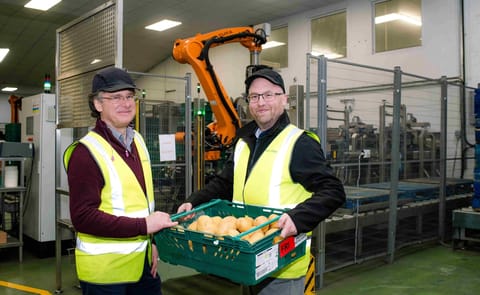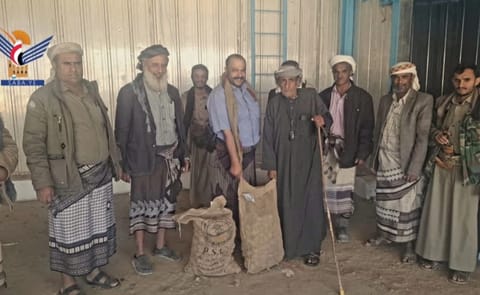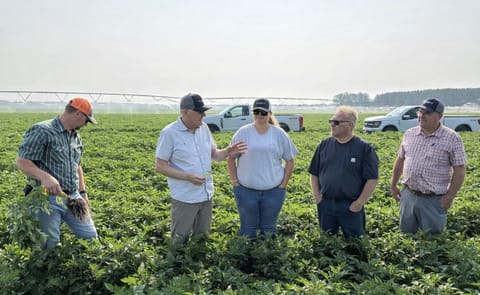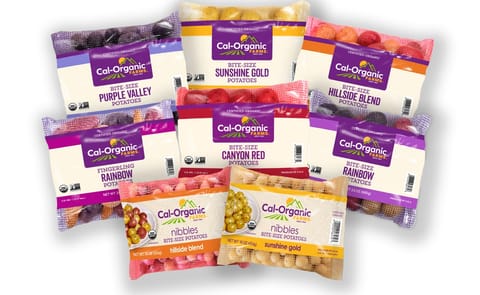Solapas principales
Nova Scotia Couple Heeds the Call of The Family Farm, Sets Down New Brunswick Roots

Timber river couple Jonathan Kummer and Emily Ryan.
The Covid-19 pandemic moment was a 'now or never' moment for Jonathan Kummer and Emily Ryan. The couple was living well and working in Halifax with an organizational design firm called Symplicity Design – until Covid-19 happened.
The chaos of the pandemic was a catalyst that brought the pair from Nova Scotia’s capital to growing potatoes in rural New Brunswick.
Emily Ryan:
"Obviously, the pandemic changed a lot of perspectives for everybody. We were working full-time, long hours and working for someone else when Jonathan came to a conclusion."With life slowed down in a time of crisis, Kummer said he had time to reflect on what he wanted – and his conclusion was that he wanted to go home. Kummer told Huddle he wanted to leave his city job as an organizational designer and work with his father and mother, Pirmin and Katrin Kummer, owners of the 800-acre Timber River Eco Farms.
The 28-year-old farm near Port Elgin that employs eight is known for its Eco-Spud brand of potatoes – a brand of potato that includes the Fabula, a later-maturing variety of potato with 30 percent fewer carbohydrates than other potatoes.
Jonathan Kummer:
"When you’re in the chaos, you think about where you want to go to get out of the chaos. For me, the farm offered time I could spend with my dad, working together and that kind of set everything off."Kummer pitched the idea of escaping the city and relocating to Ryan, and they agreed they wanted to work on the farm as Kummer’s father considers retirement.
Jonathan Kummer:
"Once we got that ball rolling, it didn’t stop."A new calling
While Ryan continued with marketing work clinching a new remote gig with m5 Marketing Communications, Kummer pivoted to full-time farming alongside his father and the pair moved to Sackville.
Ryan’s work includes building the Eco-Spud brand by promoting the farm, which opened in 1993 when the senior Kummer immigrated from Germany. Ryan has bolstered the farm’s presence online, spreading awareness of its low-carbohydrate potatoes.
Emily Ryan:
"There was a bit to do to get it up and running on the marketing side because nothing was ever done. They had an outdated website – but the operation side has been steady."On the farm also grows grain and forage crops and raises 90 head of beef cattle. Since moving onto the farm in October 2020, Kummer and Ryan helped plant and harvest a crop that at the time of writing, was six million pounds worth of potatoes.
Timber River’s crop rotation strategy.
Jonathan Kummer:
"One year, the fields with have potatoes, the next, it’ll be barley and the next it’ll be a mixture of grass – or potentially, two years. Our field rotation planning goes years into advance."This summer has been a wet one – almost too wet, as earlier in the month, moist conditions were slowing down how quickly they could harvest their spuds. Although Kummer expects a good yield, conditions are so moist he’s hoping for a dry fall – a far cry from what many New Brunswick potato farmers were dealing with in fall 2020.
Although Kummer expects a good yield, conditions are so moist he’s hoping for a dry fall – a far cry from what many New Brunswick potato farmers were dealing with in fall 2020. Although conditions vary from region to region, depending on soil types, a drought-stricken summer of 2020 led to significant yield reductions for many New Brunswick potato farmers.

New Brunswick's potato in a field
Jonathan Kummer:
"At each stage of the growth phase, there are high risks involved that you’re trying to mitigate. It’s a complete pendulum swing from one extreme to the other."Although there is a lot of pressure, Kummer and Ryan credit the senior Kummer’s guiding hand, informed by three decades of farming experience.
Kummer of his father:
"You still get stressed, but it’s harder to faze him. I can read off him how bad a situation is. With enough planning, you can work around most situations, barring major catastrophes. Farming’s always going to depend on the growing season and weather. That’s what you get and that’s what you have to be okay with."On the lifestyle side, Ryan described the migration out of Halifax as a shock at first. With Covid-19 protocols in place, they were unable to return to Nova Scotia on account of border closures.
Emily Ryan:
"It was definitely an adjustment over the winter – but to be honest, New Brunswick has been a pleasant surprise. Sackville is a beautiful community."Same spuds, a new package
When they joined the farm, Kummer and Ryan revamped the bags its potatoes are sold in. Eco-Spuds are now sold in 100 percent compostable bags, supplied by Grand Falls-based Émile Sénéchal & Fils.
Jonathan Kummer:
"We removed the plastic mesh in the back of the bag, where there was a window and we know there are just holes. The bags are manufactured with water-based glue and ink as well."Emily Ryan:
"We’re fortunate with how the farm operates, and how to manage cash flow, so we haven’t felt any pressure necessarily. I guess we feel there’s more potential and more we can do in the coming years."

Same spuds, a new package
Jonathan Kummer:
"That was in process for a few years, and now is the culmination of the project coming together. There are some things that just get backlogged and in the midst of a regular day, you just don’t have time to implement."Kummer said it was fun to take up the work of getting the solar panels set up, noting the equipment on the farm made it easy to help Smart Energy Company personnel set up the panels.
The panels, connected to the farm’s main power, are supplemented by the grid when the demand is too great for them to meet on their own. Any surplus power the panels generate on a good day is sent back onto the grid, and NB Power pays the farm for it.
Jonathan Kummer:
"It’s a cool feeling, with the feed going into the warehouse, and being able to check on an online log, to see live (electricity) consumption and generation."Even though they’re not in the thick of it in Halifax anymore, Kummer said life is not isolated in Sackville and on farmland in an area roughly between Port Elgin and the New Brunswick side of the Confederation Bridge.
Jonathan Kummer:
"You’re back in Halifax in two hours, you’re in Fredericton in two hours and Charlottetown is an hour and a halfway. You’re never really too far from anything here, but there’s beautiful scenery out here."What’s next?
When asked what the plan is moving forward Kummer and Ryan were spare on details, noting that their main goal was getting the rest of their harvest out of the ground.
Jonathan Kummer:
"Winter will be more of a planning season for us when we look at what our next projects are and what we want to get going. There are a lot of different opportunities, a lot of markets, and a lot of potentials – and we have a lot of ideas in the pipeline. The first year has been focused on getting back, getting grounded and learning the business."
¿Te gustaría recibir noticias como esta por correo electrónico? ¡Únete y suscríbete!
Get the latest potato industry news straight to your WhatsApp. Join the PotatoPro WhatsApp Community!
Empresa Destacada
Contenido Patrocinado
Contenido Patrocinado
Contenido Patrocinado
Contenido Patrocinado










